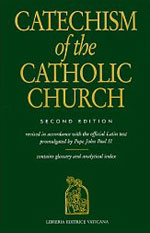It appears under the heading “Episcopal ordination—fullness of the sacrament of Holy Orders.”
#1555—“Amongst those various offices which have been exercised in the Church from the earliest times the chief place, according to the witness of tradition, is held by the function of those who, through their appointment to the dignity and responsibility of bishop, and in virtue consequently of the unbroken succession going back to the beginning, are regarded as transmitters of the apostolic line” (“Lumen Gentium,” #20).
#1556—To fulfill their exalted mission, “the Apostles were endowed by Christ with a special outpouring of the Holy Spirit coming upon them, and by the imposition of hands they passed on to their auxiliaries the gift of the Spirit, which is transmitted down to our day through episcopal consecration” (“Lumen Gentium,” #21; cf. Acts 1:8, 24; Jn 20:22-23; 1 Tm 4:14; 2 Tm 1:6-7).
#1557—The Second Vatican Council “teaches … that the fullness of the sacrament of holy orders is conferred by episcopal consecration, that fullness namely which, both in the liturgical tradition of the Church and the language of the Fathers of the Church, is called the high priesthood, the acme [summa] of the sacred ministry” (“Lumen Gentium,” #21, § 2).
#1558—“Episcopal consecration confers, together with the office of sanctifying, also the offices of teaching and ruling. … In fact, … by the imposition of hands and through the words of the consecration, the grace of the Holy Spirit is given, and a sacred character is impressed in such wise that bishops, in an eminent and visible manner, take the place of Christ himself, teacher, shepherd, and priest, and act as his representative (“in Eius persona agant”) (“Lumen Gentium,” #21).
“By virtue, therefore, of the Holy Spirit who has been given to them, bishops have been constituted true and authentic teachers of the faith and have been made pontiffs and pastors” (“Christus Dominus,” #2, § 2).
#1559—“One is constituted a member of the episcopal body in virtue of the sacramental consecration and by the hierarchical communion with the head and members of the college” (“Lumen Gentium, #22).
The character and collegial nature of the episcopal order are evidenced among other ways by the Church’s ancient practice which calls for several bishops to participate in the consecration of a new bishop (cf. “Lumen Gentium,” #22).
In our day, the lawful ordination of a bishop requires a special intervention of the Bishop of Rome because he is the supreme visible bond of the communion of the particular Churches in the one Church and the guarantor of their freedom.
 The
The